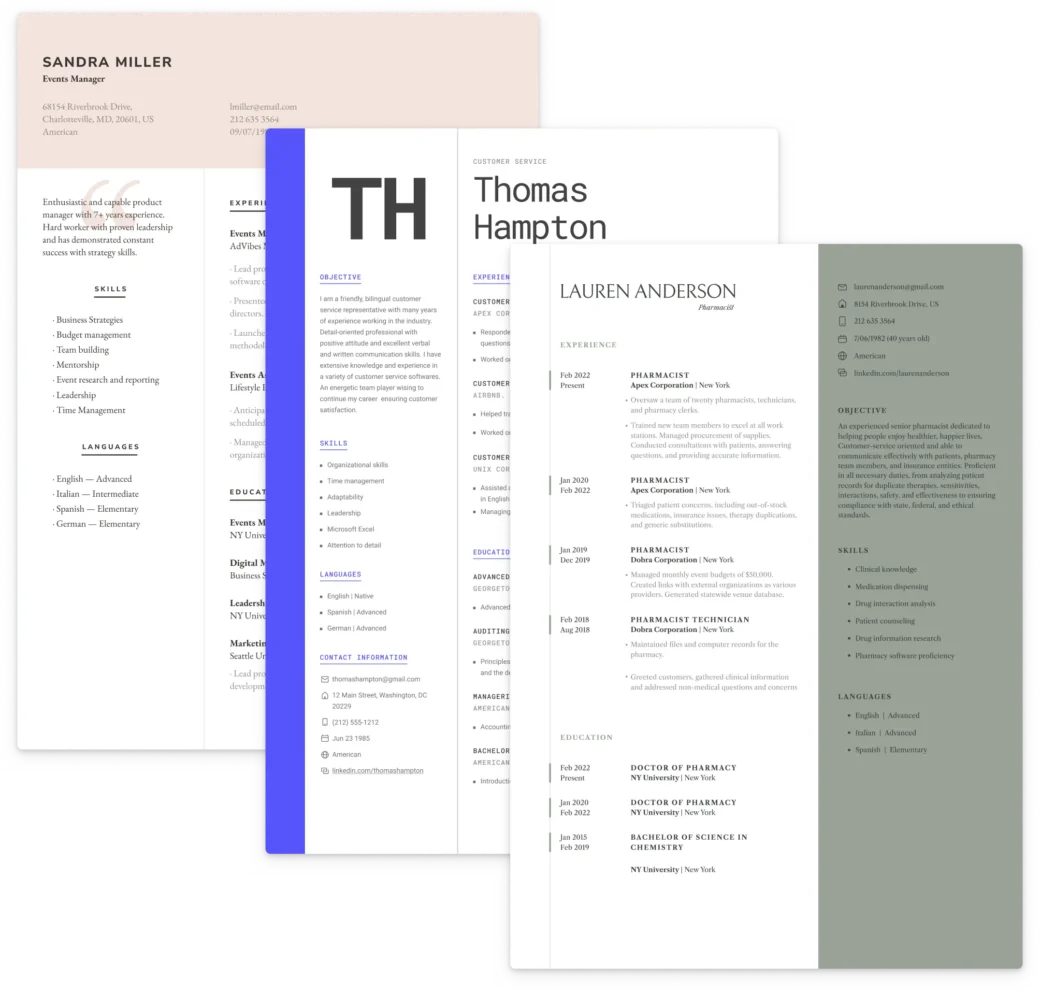Are you not completely happy with your current job and career path?
If that’s the case, it’s not a bad idea to move from one career to another. In fact, it isn’t that uncommon for people to make a career change at some point.
While changing careers can be challenging, it can also be rewarding when you find a perfect fit.
However, getting started is the tricky part. That’s why writing a detailed transition resume is critical.
By using our resume builder you can quickly add your relevant information and not worry about leaving any useful skills or experience out.
Additionally, in this guide, you’ll learn exactly how to demonstrate that you have what it takes to be successful in your new field by selling your various skills and years of experience on your new resume to impress any hiring manager.
What Is a Career Change Resume?
A career transition resume is a document that highlights your skills and experience in a new career field.
It shows employers you are willing to adapt to new challenges, and it demonstrates that you have transferable skills that make you capable of making the change to a new career.
In other words, when an employer sees your resume for the first time, he or she should be able to tell that you can handle the responsibilities of the position because of the experiences listed on your resume.
Writing a resume when you want to change careers is a slightly different process from just updating your resume for a similar job because it:
- May have a different summary title: Include the job you want in your summary title. For example, “Target Position: Account Manager”.
- Highlights only your relevant experience: Your resume needs to contain as much skill and experience related to your new field as possible.
- Mentions transferable skills: For example, if you were a sales rep but now want to become an accountant, your resume should show that you are adept at math and logic, as well as communication skills. Use keywords to reflect these.
By tailoring your resume to include these points, you’ll give yourself a better chance of landing a job in a new field when changing careers.
Why Is a Transition Resume Important?
A transition resume is a marketing tool that can help you stand out from the pack and show how your previous career experience will benefit your new employer in a new field.
Here are some reasons why a transition resume is important:
- Shows why you’re qualified for the job: Your resume should show why you’re qualified for this specific position, but it also needs to highlight how that experience will be helpful in this role.
- Demonstrates you have relevant skills: Even if it is a completely new field, you can use your resume to show your skills in your old line of work will be useful. For example, the communication skills you developed as a waitress would be relevant to a customer service rep role.
- Proves you are motivated: You can show that you will give more effort than those who have more experience in the position.
- Shows that you’re an employee who is adaptable: Explaining what you did in your previous job and how it relates to the job you are applying for demonstrates adaptability.
If there are any gaps in employment, focus on what those experiences taught you and how they’ll help in this position
How to Write a Resume for Career Transition
Apart from the most essential sections of your resume, there are other things that you should keep in mind.
To help you out, we’ve put together some useful tips for creating resumes that are both professional and persuasive when transitioning to a new field.
Use the correct resume format
You should use the correct resume format. There are two types of resume formats that you should use when creating a career switch resume.
- Reverse chronological
- Functional.
For most jobs, especially those in the tech field, it’s a good idea to list the details on your resume from newest to oldest.
That’s why using a reverse chronological resume format is a bit more common.
It won’t be simple to convince a hiring manager of a different industry, but tailoring your resume as shown here can give you a fantastic chance of being selected.
Write a good resume summary or objective
A career transition resume summary or objective is the perfect way to get a hiring manager to continue reading your resume by introducing yourself as a competent candidate.
Your resume summary should briefly mention your best points, such as your:
- Relevant skills
- Certifications
- Past accomplishments
The following is a resume summary example for a career change:
Target Position: Software Engineer
Former stockbroker with 5+ years of experience analyzing market trends and managing a $5M+ portfolio, showcasing strong analytical and data-driven decision-making abilities. Completed a 9-month software engineering bootcamp, honing skills in Python, Java, and SQL. Ready to leverage a blend of financial acumen and technical prowess to drive impactful software solutions.
A resume objective is also an option, however, they aren’t used as much nowadays. In this case, it’s crucial to find connections to the new career in the form of transferable skills.
Choose skills that can be transitioned
According to a McKinsey & Co. report, by 2030 there could be a need for 12 million employees to change their careers in the United States (mainly due to the development of technology such as generative AI).
That’s why explaining how the skills on your resume and be used in another field is arguably the most important part of a resume when you are changing career.
💡top tip
When choosing skills to list, highlight what is valuable in the targeted industry.
You can do this by listing the transferable skills that are most relevant to your new career.
To decide what you should list on your application, you should ask yourself:
- What are employees in this industry good at?
- What does the hiring manager want their employees to be able to do?
Take a look at the following example of an IT systems administrator job description:
Job Description: IT Systems Administrator
Responsibilities:
- Manage LAN, WAN, and internet systems.
- Monitor and adjust network performance.
- Address user-reported network issues.
- Implement network security.
- Ensure connectivity of all network devices.
We can see the employer wants someone who can take care of these types of tasks. Here is an example of transferrable skills that would be a good idea to add to a transition resume:
Project Manager
>> Skills <<
- MS Office proficiency
- Cloud collaboration
- Database management
- Network Monitoring
- Risk management
- Version control
- Documentation of project developments
While it’s a completely different position, by following an example like this you can show that you can quickly adapt to a new job.
Highlight Work Experience in a Resume When Changing Careers
Now that you have identified the skills that are transferable from your current career to a new one, it is time to talk about how you’ve used those skills in the past.
If the position requires you to perform a certain task, then demonstrate how your prior experience can help you.
For example, if you are applying for a job as an accounting assistant but don’t have any accounting experience on your resume, then focus on your organizational skills and attention to detail.
Let’s look at a couple of examples of how a project manager who wants to be an IT systems administrator can mention their past duties on a transition resume.
Wrong ❌
I worked as a project manager for 7 years and managed various projects.
This doesn’t explain how this candidate would make it in their role. More information should be included and as relevant as possible.
Right ✅
- Managed over 40 projects, ensuring an average of 95% on-time and 10% under-budget delivery, highlighting anticipatory problem-solving.
- Utilized Microsoft Office Suite, particularly Excel, for data analytics, and maintained 3 project databases in Microsoft Access.
- Integrated Google Workspace and Microsoft Teams, improving team collaboration by 30% and streamlining communication.
This will tell a hiring manager a lot about what you can do. You can see that the candidate used data and information relevant to the IT systems administrator position.
You can apply these tips to any job when changing careers, especially if it’s in the field of technology.
Include certifications to show off your expertise
Before you send in your application, you should have time to take a course related to the field you want to work in.
Adding degrees and completed courses to the certifications section of your resume can help you by:
- Showing off your commitment: This section can show how prepared you are for the career switch.
- Boosting your credibility: Adding recognized certifications can validate your knowledge.
- Differentiating you from other candidates: The section can also help you stand out against those with direct field experience.
By adding the relevant knowledge that you’ve gained you can prove on your resume that you won’t have too much trouble understanding complex tasks as you change career.
Key Points
Writing a resume for a career change is not usually as straightforward as updating your resume for a similar job to the one you have.
However, if you keep the following points in mind you should give yourself a much better chance of being quickly noticed by an employer:
- Highlight your most relevant qualifications
- Show off certifications
- Be clear and detailed when describing your accomplishments
- Use online tools to create your resume
To help you apply these tips, you can use our handy builder or resume templates to make the entire process much quicker and easier.

Build your perfect resume with ease
Craft the perfect resume effortlessly with our builder. Get started today!
Related Posts
